#culturally religious
Text
By: Ryan Burge
Published: Apr 29, 2024
Sometimes I write a piece and a few weeks later I completely forget that I published it. I am not going to point out any specific examples on this Substack, but rest assured there are numerous occurrences where I've Googled an answer to a question and stumbled upon an article that I wrote at some point in my career, only to have forgotten about it entirely. As one of my homiletics professors said during my undergraduate studies, "not all sermons can be home runs." The same goes for public writing, I suppose.
But there are some little threads that I have exposed in earlier work that I just can’t shake. Sometimes, this is a result of giving a talk that goes really well and drives a lively Q&A, which then gets my mind spinning with possibilities. This was certainly the case when I was at Asbury University a few weeks ago, presenting some graphs from two posts that have run on Graphs about Religion.
They both circle around this idea that I have been exploring for a while—that religion doesn’t mean what most people think it means. Increasingly, it’s not some kind of theological ascent where people come to a clear understanding of Jesus, Mohammad, nirvana, etc. I just don’t think that’s how religion works in 21st-century American life. Instead, I believe that religion has been reduced to little more than a tribal marker, much in the same way that people say they are a fan of the Yankees, or they are Irish, or graduated from Stanford. It’s a way to create an "us vs. them" dynamic.
But there’s more evidence for this theory, too. There’s an increasing number of people who say that they are evangelical, yet they go to church less than once a year. Or, there’s a growing phenomenon of non-Christian faith groups like Jews, Muslims, and Buddhists who will tell survey administrators that they too are evangelicals. As I have shown, it’s pretty easy to predict why this is happening—it’s much more prominent among Republican non-Christians than among Democrats. Religion is not about a sense of the Divine; it’s about what tribe you associate with and what kind of cable news you consume.
So, consider this another entry into that larger discourse. This time I wanted to zero in on a small subset of people that I just can’t stop thinking about. Here’s the setup:
There are a handful of religion questions on mainstream surveys. One is, “How important is religion in your life?” Responses range from "not at all important" to "very important." They are also asked, “aside from weddings and funerals, how often do you attend religious services?” with response options that go from "never" to "more than once a week." Let me just show you how the sample breaks down on these two metrics in a heatmap.
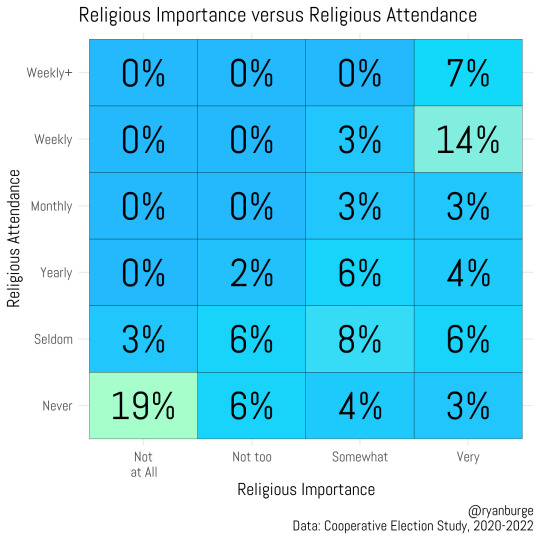
It should come as little surprise that the top left is sparse. Not a ton of people are high attenders but don’t think that religion is very important. That would be completely nonsensical. The most populated square is the bottom left—those who say that religion is not at all important and they never attend religious services—about one in five Americans fall into this box. In fact, the bottom left four boxes comprise about a third of the entire sample—that’s low attendance and low importance.
In contrast, about 7% of folks attend more than once a week and say that religion is very important. The top right four boxes equal about a quarter of the sample—those are the more religious folks.
But look at the bottom right, that’s where I wanted to focus my attention for this post. Specifically on people who meet two criteria:
They say that religion is very important.
They report their religious attendance as seldom or never.
In the sample from the last couple of years, that equals about 9% of folks. That’s not nothing. In fact, if you extrapolate that out to the adult population of the United States, that might mean 20-25 million people are high importance/low attendance.
Is there a growing trend, though? Are more and more people saying that they think religion is important, then just not showing up for a weekend service?
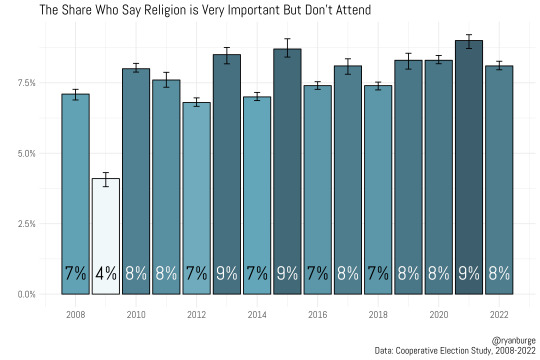
I’m not sure if that’s the case or not. There may be an increase in the trend line, but it’s not a huge one. Between 2008 and 2012 (let’s exclude 2009 as an outlier), I’m pretty confident in saying 7-8% met this criterion. But that figure has slowly crept up over time. Now, since 2019, the share who check both these boxes is likely in the 8-9% range. So, I think it’s fair to say that it’s a growing phenomenon, but not a rapidly growing one.
But I had to look under the hood of this one just a bit. Are there certain factors that seem to be driving this phenomenon of cultural religious people? Obviously, politics was the first thing that came to mind. So, here’s the trend line for Democrats, Independents, and Republicans between 2008 and 2022.
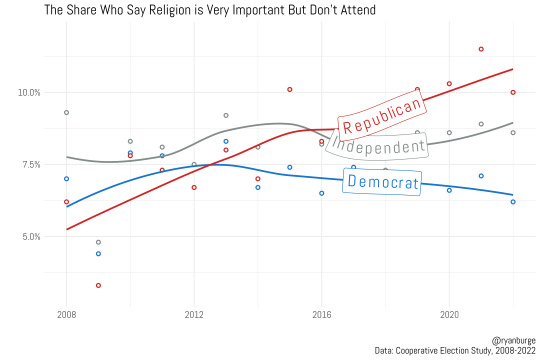
Okay, now I think we can see a clear shift. Among Democrats, the share who say that religion is very important but don’t go to church is stable over time. It was about 6% of them in 2008, and it’s essentially the same share today. For Independents, it’s probably a modest increase. It hovered around 7.5% for a while during Obama’s first term, then began to slowly creep up. Now, it’s probably the case that 8.5-9% fall into this camp.
But among Republicans, there’s no mistaking what is happening here. The share who are culturally religious has risen quickly. It was about 5% of all Republicans in 2008 who said that religion was very important but they attended services less than once a year. The trend line in 2022 was just about 11%. So, today, a Republican is twice as likely to be culturally religious compared to a Democrat.
I had to take a look at age, but I really had to think about how to visualize this in a way that is not deceiving. Because there’s a big problem when you combine two metrics like this: a lot more older people say that religion is very important compared to young adults. In fact, it’s 50% of those in their seventies, versus just about a quarter of college-aged young people. So, of course, more older people are going to be culturally religious, just based on that criterion.
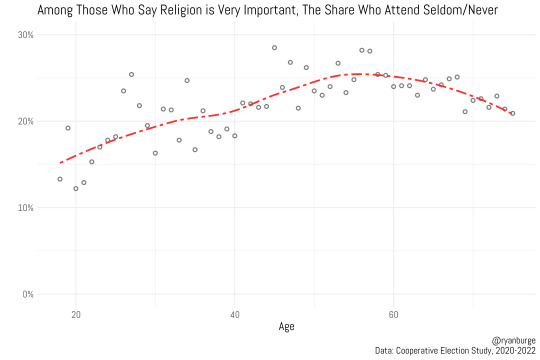
So, I had to switch it up a little. I restricted the sample to just people who said that religion was very important, and then I calculated the share who described their religious attendance as seldom or never. This gets us closer to the actual reality.
About 15% of younger folks place a high value on religion but just don’t go to religious services, but the share begins to climb from that low point. Among 40-year-olds, it’s just slightly more than 20% who are in the seldom/never category of attendance. It really peaks among people in their fifties. Among 55-year-olds who say that religion is very important, a quarter go to church less than once a year. It does decline a bit beyond that point, but it’s still north of 20% even among folks in their seventies.
I wanted to put a little bow on this post by putting all this to a more rigorous test—a regression analysis. The dependent variable is identifying as culturally religious (religion is very important + I attend less than once a year). I threw all the basic suspects into the model—age, income, gender, race, education, and political conservatism. This model is awesome because everything is predictive in one way or another. That’s not usually the case.
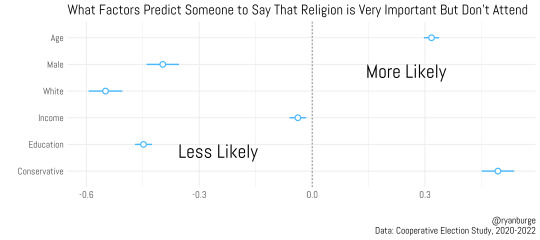
There are four factors that predict a lower likelihood of being culturally religious: income, education, being white, and being male. The one with the largest coefficient is race. A white respondent is significantly less likely to be culturally religious compared to people of color. This is followed by gender and education. The least predictive is income, but it’s still statistically significant. All drive a lower likelihood of cultural Christianity.
There were two factors that make someone more likely to say that religion is very important but they don’t go to church: age and political conservatism. All things being held equal, older people are more likely to be culturally religious. The same is true for being a conservative.
I don’t why but I can’t stop conjuring an image in my mind when I was thinking through this data - this is Andy Griffith Show fans. It ran for eight seasons in the 1960s. In many ways it’s the most wholesome show you can get. No sex, no drugs, no swearing. Just good morals. Ted Koppel went to a small town in North Carolina that was Griffith’s birthplace. It’s revitalized it’s economy by becoming a haven for tourists to revisit a bygone era.
They like the clean, wholesome nature of Mayberry. They watched the show as kids. They want to go back to that earlier time. But they just can’t manage to make it to church. They want to recreate the era of Andy Griffith, but not expend the actual effort of sitting in a pew on a Sunday morning. It’s just another example of people who like the idea of religion, but not the actual religious part.
#Ryan Burge#culturally religious#cultural christianity#empty the pews#decline of religion#religion#christianity#religion is a mental illness
5 notes
·
View notes
Text

Maiden of Light
#artists on tumblr#i'm so ready to be over winter#spring and warm weather can't come soon enough#my mood is directly linked to the temperature#so i'm trying to cope by channeling my nordic roots#lucia maiden is a cool bit of culture that i always liked as a kid#the whole school would be standing along the long hallway#in the dark#holding candles#while the one chosen as lucia would walk through it with a wreath and candles on her head and we all sing the Sankta Lucia song#i'm not religious but#the VIBES#were immaculate
14K notes
·
View notes
Text
I cannot express how jarring it was after being raised by a "Porn Addiction Coach" to get into a relationship with a woman and come face to face with the fact that she did actually want me to sexually desire her.
Like, in Evangelical Purity Culture, male desire was basically poison. It was a threat. It was this constant temptation that would destroy everything. And even after leaving, in the sort of queer, feminist spaces i spend most of my time in that wasn't something that pretty much anyone was spending time actively dissuading me from feeling.
But my desire is good. It's not something that I'm being accepted in spite of. It's a positive thing. It's a bonus. Not even just vanilla stuff, all the stuff I'd convinced myself were these weird terrible desires that were shameful to have.
It honestly took me over a decade to fully accept that. To stop dissociating during sex and confront that I was, in fact, being a massive perv and that was fantastic and preferable and that I could accept that into my self-image without shame or self hatred.
But it's important to do. It's important to leave relationships that don't welcome that part of you. To know that your sexuality is valuable and valid and worth owning and celebrating. Because the alternative is just...not being. Either existing as yourself and repressing the part of your identity that is sexual or allowing that sexuality to exist but turning off your self while it does.
#religious trauma#ex christian#deconversion#evangelical purity culture#purity culture#me writing stuff
22K notes
·
View notes
Text

†
#religious imagery#goth#gothic#gothcore#rural#ruralcore#rural america#southern goth#ethel cain#hayden silas anhedönia#southern gothic#preachers daughter#preacher’s daughter#rural aesthetic#rural gothic#rural decay#rural life#rural photography#appalachian gothic#appalachian culture#cowboy#southern goth aesthetic
4K notes
·
View notes
Text
realizing it may not have been entirely clear, underage means 12 or under since you're not meant to join tumblr until you're 13.
Didn't think "prev" needed an explanation, but two people have asked, so. Prev means the person you're seeing/reblogging this post from, hence, prev (previous). If the person who reblogged this on your dash is named @/abcdefg, that's prev. if you reblog the post, you become prev for the next person who follows you and sees it. etc, etc. prev is the last person in the chain, whom you see it from.
#i wouldnt have gone that high but my mom is fifty something and she's on here religiously so#existenceunrelateds#poll#polls#tumblr poll#tumblr polls#reblog game#tumblr culture#poll game#tumblr#reblog this
6K notes
·
View notes
Text

Home
#appalachian gothic#southern goth aesthetic#appalachain mountains#southern gothic#southern style#occultism#religious trauma#american gothic#occult#you tasted love and it tasted sweet#vulture culture#photo dump#teenage dirtbag#photo edit#photografy#taxidermy
5K notes
·
View notes
Text

every church in the carolinas
#unknown source; please dm or reply if you know it#appalachian gothic#american gothic#americana#appalachian#appalachian culture#southern#small town america#southern gothic#appalachia#ex religious#religious trauma#liminal spaces#yall come back now queue hear?
4K notes
·
View notes
Text
yes i am a joker-kind user and zilly enthusiast, yes i hate the dark carnival and all that is affiliated with it. we exist.
683 notes
·
View notes
Text
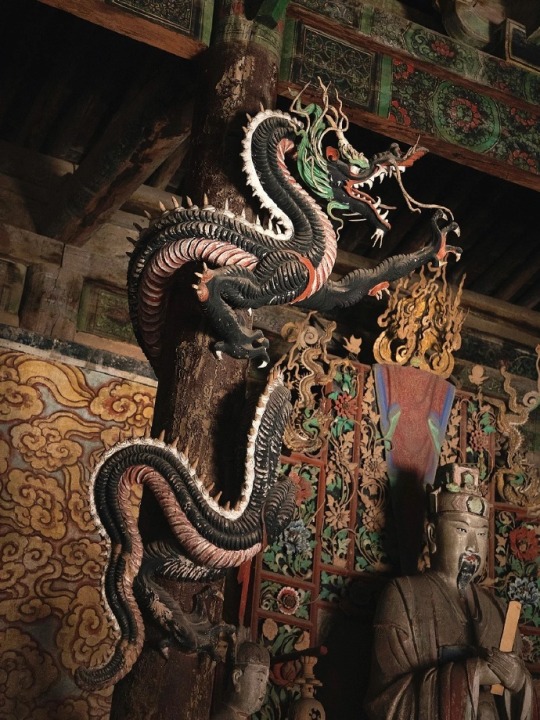
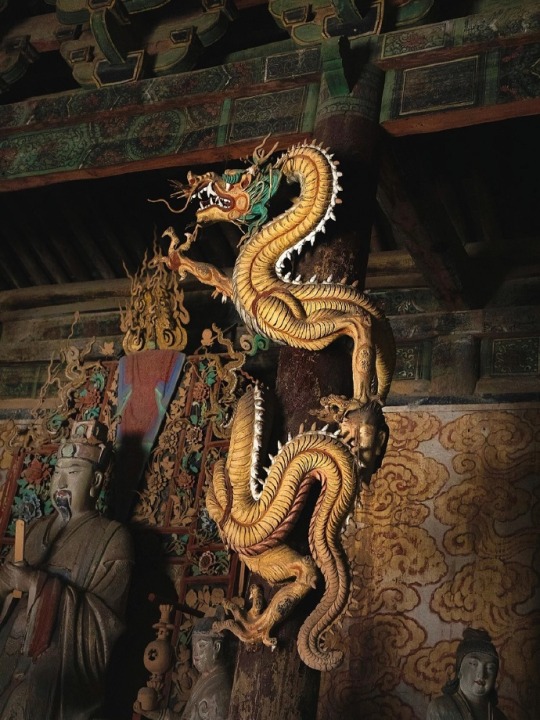
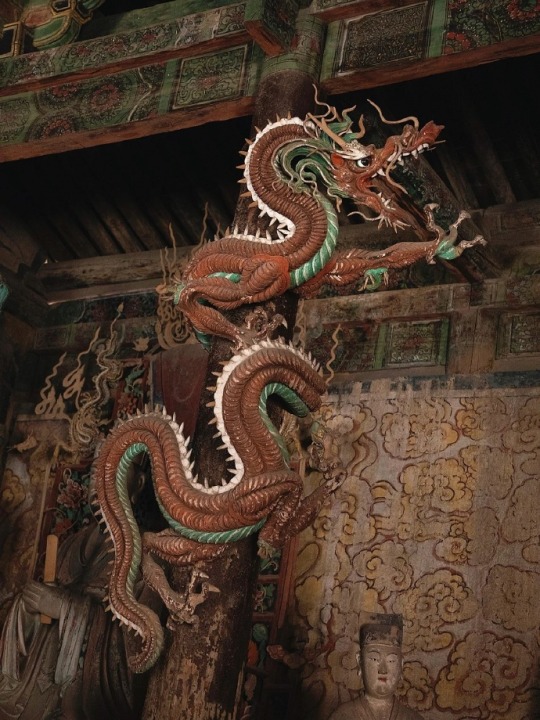
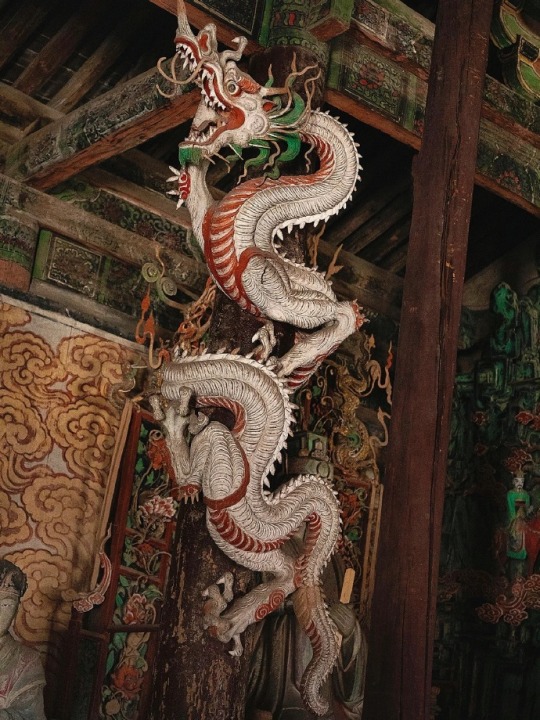

Mythological Realism: Elemental Dragons
Four-color coiled dragons on the pillars of the Supreme Talisman (Taifu) Temple (太符觀).
The dragons are painted in the colors of the primary elements, embodying the archetypal creative forces. In Chinese religious art, almost any concept can be expressed in the language of dragons.) Their children, descendants and relatives frolic on the temple walls among curly clouds.
In view of the striking liveliness, I would classify these images as mythological realism.)
Since its construction in the fifth year of the Jin dynasty (1200), the temple has been repeatedly expanded and supplemented with new buildings over the centuries. Most of the surviving statues are from the Ming dynasty.
The Supreme Talisman Temple is located in Fenyang (汾陽), Shanxi.
Photo: ©故尔耳
#ancient china#chinese culture#chinese art#chinese mythology#ming dynasty#taoist practices#religious art#chinese temple#Taoist temple#taoism#taoist#statue#sculptures#statues#daoism#jin dynasty#dragon#dragons#dragon art#creatures#wood carving#woodworking#temple architecture#wooden architecture#wooden buildings#chinese architecture
509 notes
·
View notes
Text

Lotus-Headed Fertility Goddess Lajja Gauri
India (Madhya Pradesh)
ca. 6th century
Metropolitan Museum of Art
#fertility#goddess#fertility art#india#art of india#religious art#indian culture#indian art#ancient art#ancient cultures#stone carving#art history#aesthetictumblr#tumblraesthetic#tumblrpic#tumblrpictures#tumblr art#aesthetic#beauty#tumblrstyle
242 notes
·
View notes
Text
i actually think ppl dealing with religious trauma by having an edgy atheist phase is fine. I actually think maybe the kid who makes sorta cringey jokes at the expense of a cult they're trapped in should be allowed to do that. Yes I roll my eyes when I see people calling it "the book of moron" but I also remember being fourteen and seeing someone do that and how incredibly powerful it felt so I think maybe it being a bit cringe in retrospect is fine.
#no one ever fucking. mentions that part of cringe culture. when theyre criticizing it#like no one's willing to defend teenagers who are maybe kinda annoying abt their religious trauma!! worst crime in the world i guess#oh noooo the kid who's forced to attend a church that tells them theyre evil for existing said god is fake and they were SMUG abt it!! 😱😱#who caressss if u think its stupid its not FOR you#ties into my feelings about teenage rebellion being 'cringe' in general tbh. like sorry the person who has zero autonomy is acting out#maybe you should! treat them like a person! that might help who knows!#exmo#exmormon#religious trauma
289 notes
·
View notes
Text
Obligatory "bad mormons exist" disclaimer but I love us, I love mormons. Cheesy but sincere thought: I love the way we love each other. I love feeling embraced by a ward, I love feeling like the other ward members around me look forward to seeing me, that they make an effort to include me. I love the concerted effort we put towards sincerely fellowshipping. I love ward members who text me to check in or say hi. I love how enthusiastically one senior elder has been waiting for me to try his favorite ice cream place. I love leadership who are awkward but really trying to make conversation so you feel comfortable. When mormons fuck up, they fuck up bad, but when they get it right, it WORKS. Truly the dream at rhe heart of mormonism is a tight community of people socialistically trying to improve each other's lives and idk it just makes me feel really good to see it. There is so much good in us as a community. I just love mormons.
#queerstake#tumblrstake#an additional part of this feeling is i love HAVING a community i love having a shared religious culture a shared history#this cool church legacy weve all inherited#but i recognize thats more to do w like the nature of community v mormonism in particular
214 notes
·
View notes
Text
i'm still on "i come from catholics. latin catholics." because explaining the fact that he was raised in the church is explanation enough for the guilt and the complicated feelings towards religion. the fact that he associates being latino with catholicism or maybe catholicism with being latino is what really gets to me. eddie ties this religion — this religion he feels so guilty for abandoning, that still follows him around him everywhere — with his culture. being mexican, being latino, is integral to eddie. abuela's tamales and telenovelas and machismo he refuses to pass down to his son. and, in his eyes, catholicism is twisted in with that. the kind of knot you can't undo. that goes so much deeper than just a complicate relationship with religion. it's not just religion, it's culture, too. his culture. it's the people he grew up with, it's his childhood friends he met at his catholic elementary school, it's the church in el paso where he got married before shannon started showing. eddie thought he was free from catholic guilt because he stopped going to church a long time ago and he was fine with that, but he'll never stop being latino. and that, to him, is inherently religious. god, the implications of that. the fact that, to eddie, being queer wouldn't just disappoint a god he doesn't believe in anymore. it'd separate him from his culture. because he's okay with going to hell but who is he without abuela's crossing? without his st christopher pendant? disappointing god isn't the problem. not having a place to belong is what's terrifying.
#bia rambling about eddie being latino and religious and queer? oh wow golly gee what a shocker!#eddie diaz#911 abc#my post#eddie & latino culture
390 notes
·
View notes
Note
Stop misappropriating the abuse and trauma cults use through purity culture for your stupid fucking shipping discourse? Holy fuck no wonder everyone hates this whole discourse.
Since when is "priests getting shuffled around after raping kids and kids being told they're sinful because they had bodily reactions to being SAd" comparable to "Bobo the clown said my ship was cringe"
I'm not gonna answer this with The Aristocrats, as a I threatened, because I want to make a very serious point to this anon:
Purity culture isn't just religious abuse. It is most widely connected to religious abuse. Including actions in the Catholic Church and all fundamentalist Christianity. It's entire existence is about terrifying and indoctrinating people into being fearful of their own actions and bodies so that they feel certain that moving out from the "umbrella of safety" (to use a fundamentalist term) will result in them being harmed in ways they can't imagine. This is generally happening at the same time as they are being harmed by those who are supposed to be keeping them safe from all those terrible, worldly evils. Like speaking up when you're being abused. Believing you are not responsible for the actions of a rapist, and many, many other things that any person with an ounce of self-worth and good sense (two things not allowed in fundamentalist circles) knows are true in abuse situations.
But the point of the purity culture as identity in the above-mentioned circles is to teach people from birth that they aren't to have their own feelings, ideas, or instincts. They are only to follow the feelings, ideas, and instincts on the approved list in order to stay within the structures they know and feel safe in even as they feel very unsafe.
That being said:
Purity culture can also exist WITHOUT a religious structure while still being about controlling the thoughts, feelings, and actions of everyone within it. In terms of fandom, purity culture is groups of people stating that if you write something uncomfortable or gross or immoral, then YOU must be uncomfortable or gross or immoral and therefore, not worthy of the safety and moral superiority of the group.
Purity culture without religion teaches black and white thinking, encourages thought policing, and shames anyone who steps outside of a very narrow definition of good and bad by turning an entire group of people against them for being "bad".
Just like in religious circles.
Just like in the cult of fundamentalism.
Purity culture is a term taken by fundamentalists and turned into a whole way of life because the goal of fundamentalism is to make people too scared to leave. Purity culture in fandom does the same thing. It uses fear and threats of abandonment/harassment to control the way people act because a group of people decided they didn't like something, so they must try and wipe it out rather than simply ignore it.
I am not mis-using the term because "Bobo the clown said my ship was cringe." My use of the term is intentional and precise because what is happening in fandom spaces now is non-religious purity culture cult thinking. My use of the term does not invalidate or water down the use of it in conversations about religious abuse and trauma. With or without religion, purity culture is a dangerous cult of "us vs them" that is built to demoralize and eradicate those deemed unworthy.
#purity culture#purity wank#religious trauma#religious abuse#it's all the same shit#just wearing slightly different hats#ask#anon#answer
1K notes
·
View notes
Text
I hate it when xtians reduce my religious trauma to "a religious person said something mean to you once so now you're mad at religion".
Like, shut the fuck up. My trauma isn't just someone being a little rude to me once, it was systematic, deliberate manipulation with the threat of possible eternity of suffering in Hell if I didn't obey religious rules and "keep Christ in my heart". It was "Nonbelievers burn in a lake of eternal fire. Tell your friends to convert to our faith or they'll be damned for eternity".
I have suffered from anxiety, ocd and other mental health issues for several fucking years because of this shit. I've suppressed my sexuality and felt terrible guilt just for the 'sin' of having sexual thoughts. I've feared for my loved one's souls, genuinely believing they would go to Hell for simply not being xtians and that I'd never see them again in the afterlife.
These beliefs are sick and twisted. What I went through was sick and twisted.
I seriously don't know what to say to you if you still think telling anyone, let alone a child, that they're going to be damned for eternity if they disobey 'God's word' is totally fine and not abusive.
Know your fucking place and stop speaking over trauma survivors who have been hurt by your shitty religion.
#ex religious#religious trauma#fuck christianity#anti christianity#anti purity culture#ex christian#ex baptist#fuck conservatives#anti conservative#right wing nut jobs#conservative insanity#online drama#vent post#vent tag#tw hell mention#tw eternal damnation#hell tw
397 notes
·
View notes
Text
i don't know who needs to hear this today but the jedi would not be body-shy
especially during the war. some would be uncomfortable, sure, or even heavily dislike being nude and/or bathing around others, but the point of that is that would be respected as a choice. there is a very large difference between preferring not to be nude around others, for cultural religious or personal reasons, versus being ashamed. nothing you can do can convince me jedi would be ashamed or embarrassed of their or others' bodies.
why. why would the jedi think nudity undignified. why would they turn their noses up at it as unseemly, rather than a choice and preference
#im exhausted alright#wearing layers especially in the more religious way jedi do does not equal SHAME of one's body#some!! species!! dont even!!! wear clothes at all!!!#i dont have the sources to back it up but this is such a western idea specifically a euro- and ameri-centric one#im just so tired of master obi one kenobi COMPLAINING about changing or wearing other clothes than robes in fic#because it's never framed as obi wan being uncomfortable because it's a preference or because it's a cultural/religious thing#it's ALWAYS because hes embarrassed about his body or nudity in general#not being down with nudity for whatever reason does not automatically mean SHAME and it staggers me that people seem to#sincerely think the jedi would enforce or support or legitimise such shame#i know it's probably just authors' implicit or unknown biases but good lord it's exhausting#cj rambles#jedi order#prequel trilogy#pro jedi
196 notes
·
View notes